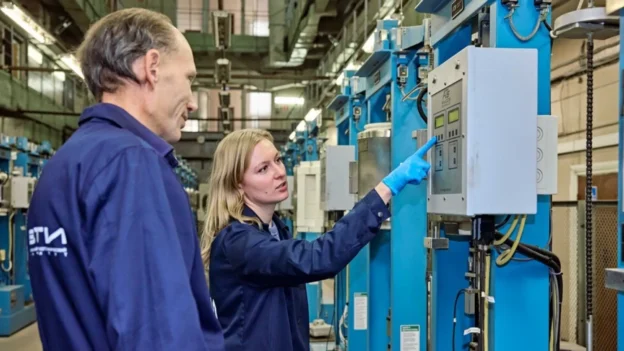The All-Russian Thermal Engineering Institute(VTI) has completed a series of long-term endurance tests on a steel specifically designed for next-generation nuclear reactors.
The research focused on EP302M-Sh steel, a material selected because of its high corrosion and heat resistance, essential properties for the construction of safe and durable nuclear infrastructures.
Tests on specialized steel for future nuclear reactors
The tests, which were conducted over a wide range of temperatures and loads, are notable for their unprecedented durability. In total, the tests amounted to approximately 400,000 hours, with some individual samples reaching more than 25,000 hours of endurance. This intensive approach has confirmed the reliability and durability of the steel under extreme conditions, ensuring its performance over long periods of operation in nuclear reactors.
The engineering challenge faced by the VTI specialists was significant. Due to the complex geometry of the pipes, with a diameter of only 18 mm and a wall thickness of only 3 mm, it was necessary to develop specialized test specimens and a fastening system adapted to the particular characteristics of the material. This innovation in testing methods underlines the sophistication and technical level achieved during the research.
Ivan Boltenkov, CEO of JSC VTI, commented, “The research conducted goes beyond a simple test cycle; it constitutes the creation of a solid scientific and technical basis for future innovative projects in nuclear energy. The guaranteed design features we have obtained will enable us to design equipment with a high margin of reliability and safety.”
The results of this exhaustive work have already been transferred to nuclear reactor design companies. nuclear reactor design companiesThe results of this comprehensive work have already been transferred to nuclear reactor design companies, who will use the long-term strength characteristics of EP302M-Sh steel in the design of advanced nuclear power plants. This breakthrough lays the foundation for the safe and reliable development of the Russian nuclear power sector for decades to come.
With this research, VTI responds to the challenges of the global energy sector, contributing to the creation of safer, more efficient and sustainable nuclear infrastructures. The research also strengthens Russia’s technological sovereignty, ensuring that the country is at the forefront in the development of advanced nuclear technologies.
Source and photo: VTI

